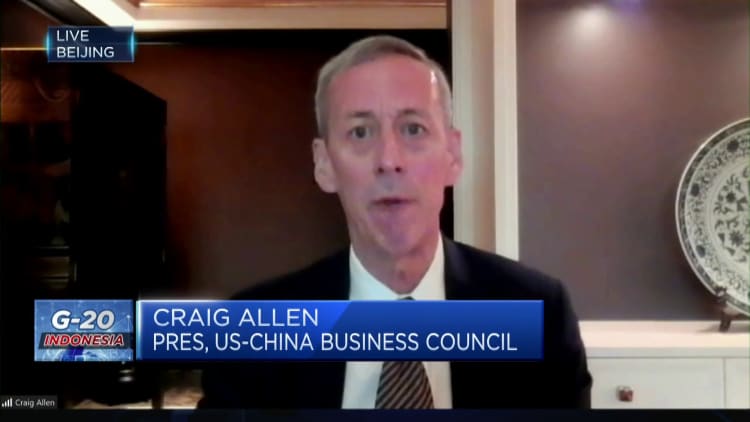The closely watched meeting between the leaders of the world's two largest economies was seen as a positive sign for the future of a relationship mired in tensions that have hurt global growth, but not much change is expected for trade, said one strategist.
For the first time since taking office, U.S. President Joe Biden sat down in a face-to-face meeting with his Chinese counterpart Xi Jinping for over three hours, a symbolic move hailed by many as a positive sign.
But it's unlikely that trade tensions between the two superpowers will see concrete improvement anytime soon, according to BMO Wealth Management.
"I wouldn't expect any easing at all," Yung-yu Ma, the firm's chief investment strategist, told CNBC's "Squawk Box Asia," adding that trade ties are, on the contrary, likely to deteriorate.
He expects the U.S. to announce even more measures on top of the the recently imposed chip export restrictions to China.
"I do think the trend is for actually increasing technology restrictions and export restrictions," he said.
The rules, publicized in early October, were imposed by the U.S. Department of Commerce. According to the United States, such advanced semiconductors can be used by China for advanced military capabilities.

"I think its going to remain a difficult time for some time to come," he said. "I think it'll remain a challenging relationship."
Ma said any attempts to deviate from the current path of imposing more restrictions would likely be met with sharp criticism from the American public.
"I think domestically, in the U.S., if any party, whether it's the president or the Republican Party that pushed for the easing of those restrictions, there would be some pretty swift domestic backlash against that," he said.
A recent Pew Research poll shows a growing majority of Americans perceive China's military power as a problem for the United States, with about half of respondents categorizing it as "very serious."
Loading chart...
However, despite Ma's skepticism, Hong Kong stocks saw a boost following the talks. The Hang Seng Tech index jumped 7.3% and saw the best day in almost two months. Shares of Chinese tech giants Tencent and Alibaba both rose more than 10% in Tuesday's trading session in Asia. Shares of the Hang Seng Tech exchange-traded fund also rose more than 6%.
'Better than not talking'
But the talks between Xi and Biden, which included an agreement to continue dialogue through unspecified plans for U.S. Secretary of State Antony Blinken to visit Beijing, were overall received with optimism.
"The meeting actually went much better than what I would have ever, what many people would have ever, expected," strategist John Rutledge at private investment firm Sanafad said on CNBC's "The Exchange," joining the chorus of analysts who have applauded the meeting.

Craig Allen, the president of the U.S.-China Business Council, emphasized that any dialogue is better than none at all.
"We've been calling for an advanced dialogue for a long time and a three-and-a-half hour dialogue is a great start," he said. "Talking is much better than not talking."
Allen also emphasized the significance of the public response from the respective countries on the bilateral talks.
"There's also a domestic political element to this as well in both countries," said Allen. "Both leaders were speaking to each other but also to their domestic audiences."

